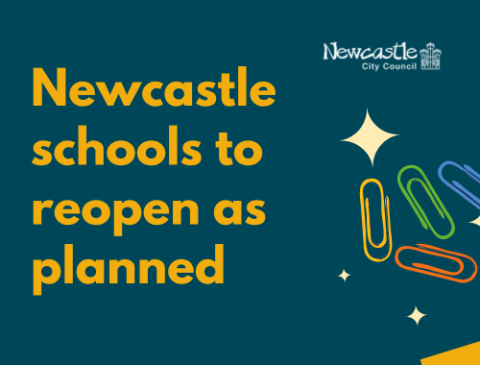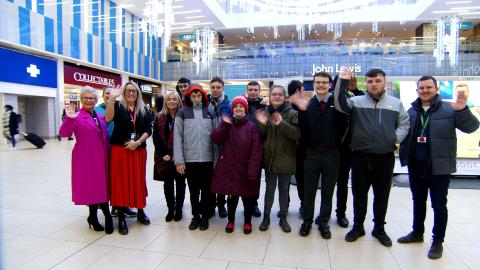3 October 2019
| | 3 min readNew project in Newcastle to strengthen families and keep children out of care
- Projects backed by £84 million launched to safely reduce the number of children entering care and improve family stability
- Newcastle chosen to expand Government’s landmark programme to address high numbers of children in or at risk of care
- Children and Families Minister: We cannot ignore the disruption caused by parental addiction, mental illness or domestic abuse

Vulnerable children in Newcastle at risk of being taken into care as a result of their parents’ problems with mental health, domestic violence or addiction will benefit from projects designed to tackle these issues early on and keep them safely together at home.
Backed by £84 million of new investment secured in the last Budget, thousands of children in Newcastle will benefit from a projects being launched in 15 new areas designed to tackle challenges when they arise at home, boosting family resilience and creating stable homes where children can thrive.
Data shows Newcastle City Council has a higher number of children in care than the national average, so it will adopt ‘Family Valued’, one of three successful projects created through the Government’s landmark Innovation Programme designed to support families to stay together wherever appropriate, so that fewer children need to be taken away from their birth families.
Councillor Veronica Dunn, cabinet member for education and skills said:
“We welcome this announcement and we are looking forward to being part of the Strengthening Families, Protecting Children programme. Being selected to work alongside Leeds and its Family Valued model will help to reinforce our transformative approach to children’s social care and help us to continue providing positive outcomes for children across the city.
“Like many places across the North East, Newcastle has seen an increase in the number of looked-after children and it is important we adapt services to meet this changing population.
“We strongly believe that working closely with families and developing relationships with children will help us protect them, allow them to reach their ambitions and goals and keep families together where it is safe to do so.
“Investing in our social care workforce, recruiting passionate and dedicated staff and creating new accommodation options across Newcastle will help us achieve this vision and ensure our Right Child, Right Care strategy benefits all young people and families in Newcastle.”
Newcastle City Council's Right Child, Right Care programme.
Right Child, Right Care
Children and Families Minister Michelle Donelan said:
“I want every child to grow up in safe, stable and loving home where they feel supported to take on the challenges life can present. However, in Newcastle we have seen increasing numbers of children being taken into care, often as a result of their parents’ mental illness, alcohol or drug addiction, or the trauma of domestic violence.
“We cannot ignore the disruption to children’s lives that these issues cause, and that is why this government is investing in projects that tackle problems head on, backed by evidence that shows it can work. The Family Valued model is already proving to be successful in keeping families safely together, and giving stability for children where it did not exist before.”
Today, a total of 15 areas join three early adopters - Darlington, Cambridgeshire and Middlesbrough – that have already started work on these programmes. All of the projects will be run in line with the core principles of the Children Act 1989, which is approaching its 30th anniversary. The Strengthening Families, Protecting Children programme will focus on areas judged by Ofsted to require improvement to be good and where the number of children in care is high or rising.
Outcomes for children in care are poor compared with their peers. They are half as likely to meet the expected standards at age 11 and are a quarter as likely to achieve good GCSEs. Into adulthood they continue to have poor outcomes: 39 per cent of all care leavers are ‘not in education, employment or training’ (NEET) compared to 12 per cent of their peers, and are five times more likely to experience the criminal justice system.
Each project, originally developed by Leeds, Hertfordshire and North Yorkshire councils – all rated ‘good’ or ‘outstanding’ by Ofsted for their children’s services – aims to build resilience among more vulnerable families and improve how councils design and run services, supporting social workers to confidently identify where families can stay together in the home safely, without putting children or partners at risk.
The three projects being expanded across the country are:
-
Leeds ‘Family Valued’: works with the whole family unit and any extended support network to encourage long term changes at home that keep children safe, taking the approach of working with families rather than imposing measures on them. Independent evaluation of the project’s impact on the target population shows that between 2011 and 2017, Leeds reduced the number of children on children’s services Protection Plans by nearly 50 per cent (974 in 2011 down to 515 in 2017);
-
Hertfordshire ‘Family Safeguarding’: creates teams consisting of mental health practitioners, domestic abuse and substance abuse workers and adult and children’s social workers to work together to improve child protection, working with whole families so that all of their needs are met. Evaluation shows this resulted in a 39 per cent reduction in the number of days children spent in care, for cases allocated to the safeguarding team, a 53 per cent drop in in hospital admissions for adults in that family, and a 66 per cent reduction in contact with the police; and
-
North Yorkshire ‘No Wrong Door’: creates ‘hubs’ where young people at risk of going into care get targeted support to cope with the multiple issues they face, including lack of accommodation or contact with the police. Independent evaluation showed the programme saw a 38 per cent fall in arrests of individuals involved during the first 18 months of the programme and a 57 per cent reduction in A&E visits.
Steve Walker, director of children and families at Leeds City Council said:
“In Leeds we believe that children are the most valuable resource we have. We know that strong children grow up in strong families, and those strong families create strong communities which makes Leeds such a vibrant and successful city.
“With partners we have used a relational approach to working with families - rather than doing things for them or to them - to ensure that when children and families need help they receive it in the right way and at the right time. Families have told us that they like this way of working and the impact of this approach can be seen in the positive outcomes we have delivered for children and young people in Leeds.
“We are delighted to have this opportunity to work with other local authorities, and to share our insight and experience of a different and more positive way for Children’s Social Work Services to work with children and families.”
Like many places across the North East, Newcastle has seen an increase in the number of looked-after children and it is important we adapt services to meet this changing population.
Councillor Veronica Dunn
Cabinet member for education and skills
If you would like to give us feedback on our website, please complete this short online form.







